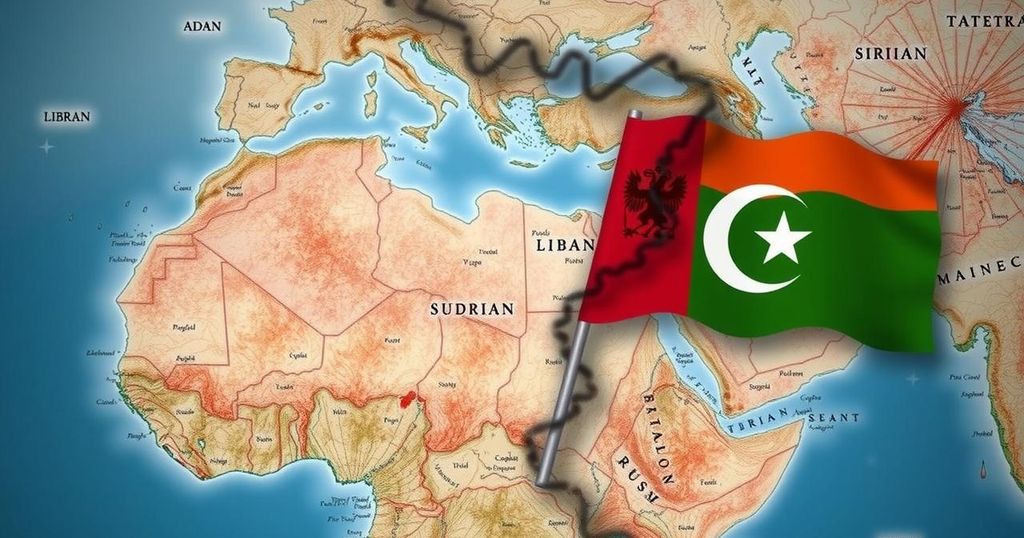Russia Reevaluates Strategy Following Potential Loss of Syrian Naval Base
Recent developments in Syria’s conflict may force Russia to seek alternative operations bases in Sudan and Libya as it potentially loses its naval presence at Tartus. The Wagner Group continues to operate in Africa, capitalizing on instability to establish influence and gain access to crucial resources. Russia’s future strategic positioning will depend on its ability to navigate the complexities of these war-torn nations.
The recent developments in Syria, specifically the consolidation of power by Syrian rebels against dictator Bashar al-Assad, pose significant challenges for Russia’s geopolitical ambitions. With the potential loss of the Tartus naval base and the Khmeimim airfield, both vital for Moscow’s operations in the Mediterranean and Africa, the Kremlin is actively evaluating alternative strategic locations, including war-torn Sudan and the divided Libya. The Wagner Group, previously instrumental in supporting Russian interests in Africa, may play a crucial role in shaping these new bases of operations as Russia adjusts its military and diplomatic strategies in response to changing circumstances.
In the wake of the conflict in Sudan, where a power struggle between the Sudanese army and the Rapid Support Forces (RSF) has created a precarious situation, Russia is reportedly negotiating to establish a naval base in Port Sudan. Previously, the relationship between Russia and Sudan had progressed, focusing on military and energy cooperation. Meanwhile, in Libya, the presence of Russian mercenaries and military infrastructure continues to grow, indicating Russia’s intent to leverage the country’s political fragmentation to secure access to significant oil and mineral resources. Overall, Russia’s strategic recalibration in the face of potential losses in Syria speaks to its broader aspirations of re-establishing influence in the Mediterranean and African regions despite facing numerous obstacles from local and international dynamics.
Historically, the Russian military has engaged in various operations across Africa, particularly under the auspices of the Wagner Group, which has served unpopular governments in return for financial benefits and resource access. Russia’s engagement in Sudan has been shaped by its desire to control valuable gold mining interests, while its strategy in Libya is focused on maximizing influence over energy resources and political outcomes.
According to Joseph Siegle, “Moscow has been supplying the Sudanese Armed Forces weapons while continuing to help supply the SAF’s enemy.” – VOA Fact Check. At the same time, the Institute for the Study of War noted that if the Tartus base is lost, Russia would be diminished in its ability to project power effectively in the region, necessitating urgent action to establish a new base elsewhere.
Ultimately, the situation highlights the Kremlin’s reliance on both military might and mercenary networks to achieve its geopolitical goals. As Russia seeks to transition its military forces and reassess its strategies in Africa, the outcomes in Sudan and Libya will significantly influence its capacity to exert influence in the Mediterranean and beyond. Although challenges remain, such as local governance issues and international scrutiny, Russia is poised to adapt its military and diplomatic posture to reclaim its strategic footholds.
The backdrop to this analysis lies in the complex and evolving geopolitical landscape of the Middle East and Africa, where Russia has been attempting to reassert its influence following the events surrounding the Arab Spring and subsequent conflicts. Russia’s military involvement in Syria since 2015, aimed at supporting the Assad regime, has served as a crucial component of its broader strategy to regain Cold War-era prominence. The recent signs of shifting power dynamics in Syria have compelled Russia to reconsider its military deployments and search for alternatives that can sustain its operational capabilities in Africa and the Mediterranean. Moreover, with the Wagner Group’s historical role in supporting Russian initiatives and exploiting regional conflicts, the dynamics in Sudan and Libya stand as potential avenues for Russia to fulfill its geopolitical aspirations.
In summary, the changing dynamics in Syria, particularly the resurgence of rebel power, threaten Russia’s strategic interests, particularly its naval base in Tartus. As a response, Russia is exploring opportunities in both Sudan and Libya, leveraging existing relationships and military presence to establish new operational bases. While Sudan offers the possibility of securing a strategic naval position, Libya provides a valuable resource-rich landscape that fits into Russia’s geopolitical calculus. Overall, the decisions made in the coming months will be pivotal in shaping Russia’s military and diplomatic future in these critical regions.
Original Source: www.intellinews.com




Post Comment